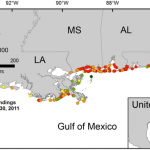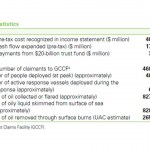oil spill
Dan Rather was the newscaster. His lead for the CBS Evening News on Friday, March 24, 1989 was:
"An oil tanker ran aground today off the nation's northern most ice-free port, Valdez, Alaska."
The Exxon vessel was holding 53 million gallons of crude oil. By 3:30 am, the Coast Guard estimated that 5.8 million gallons had already been released from the tanker. Ultimately, nearly 11 million gallons of crude oil contaminated the region.
I was reminded of today’s 28th anniversary of the Exxon Valdez disaster by my colleague Mark Catlin. At the time he was with the Alaska Health Project, a non-…
A higher than normal mortality rate for bottlenose dolphins (Tursiops truncatus) in the Gulf of Mexico during 2011 has been found to correspond with the Deepwater Horizon oil spill as well as colder weather conditions during 2010 leading to an influx of colder water into the Gulf from snowmelt. From January through April 2011, 186 bottlenose dolphins were found ashore between Louisiana and Florida, 46% of which were calves. This number is nearly twice that of preceding years (2003-2010). Using tissues collected from the animals, the actual cause of death is still under investigation.…
Yesterday on Marketplace, there was a great piece by Alex Chadwick on the fate of all the oil released during the BP oil spill two years ago.
Oil is a product of organic matter that was deposited many, many years ago. It's gone through many, many changes deep in earth under high pressure, high temperature -- but fundamentally it's an organic material.
This is hard to grasp. Oil is food, an organic buffet for microbes. So, two years ago, when the BP oil plumed in the water, very soon the bacteria plumed, too. Different kinds in different parts of the ecosystem -- deep water, shallow, shoreline…
Source, Vanessa Pike-Russell's Flickr photostream.
No, this is not a bizarre recipe. First, the good news. Extensive testing of seafood from the Gulf shows that "99%" are safe to eat, despite the fact that the fate of some one million barrels of oil from the BP Deepwater Horizon oil rig is unknown.
From Chemical & Engineering News:
...there almost never were any detectable findings of the dispersant in the fish flesh," Kraemer said. FDA and NOAA reported that all samples passed sensory testing and that LC/MS/MS showed no detectable residues in 99% of samples. For the 1% that tested…
Korycheer Happy Children
To mark the one year anniversary of the disastrous BP oil spill, I wanted to share this article that I published last summer.
Like many New Jersey families, my children and I spent several sunny, fun-filled days on the Shore last summer, enjoying mini-golf, water parks and beautiful, pristine beaches. The BP oil spill disaster loomed over our brief vacation like an ominous dark cloud.
Since the BP oil spill began, my young children have been asking a lot questions -many of which I, or anyone else, cannot answer. "Why can't they turn off the pipe?" Before we…
by Elizabeth Grossman
When the BP/Deepwater Horizon oil rig exploded on April 20, 2010, killing 11 of the 126 workers on board and critically injuring three, the ruptured Macondo well - located nearly a mile beneath the sea surface about 50 miles southeast of Venice, Louisiana - unleashed what has been called the largest accidental release of oil in history. By the time the well was capped on July 15th, an estimated five million barrels of oil had flowed into the Gulf of Mexico, affecting more than 350 miles of Gulf Coast, from Louisiana to Florida.
The clean-up response launched has also…
Every driver is faced with increasing gas prices in the midst of a recession. Each morning, I drive past this gas station (somewhere in New Jersey) that heralds "$1" per gallon gasoline. Could this be true?
Of course not. The truth is that this "$1" sign has remained unchanged for more than a year, and if you were to purchase gas at this station you would of course pay whatever is the current rate {today, April 12, it was at $3.59 for regular.} One could imagine several reasons for this; my guess is that the owners simply haven't bothered with it.
Most media coverage about gas prices…
One of the things I've been arguing for years is that most people in the developed world, given a perceived lack of alternatives and no narrative to explain change and sacrifice, will do almost anything to keep their present way of life. I point out that if they become cold enough most people would shovel live baby harp seals into their furnace to keep warm, while carefully justifying why this is reasonable and necessary and probably convincing themselves that baby harp seals like to be burned alive.
I have been thinking much about this metaphor lately, as the tone of the discussion of…
By Elizabeth Grossman
It's now almost eleven months since the BP/Deepwater Horizon drilling rig exploded, killing 11 workers, and almost eight months since the damaged well was capped. While the emergency phase of this disaster is over, the assessment of and response to its long-term impacts are just now getting underway. On February 28th, the Gulf Ecosystem Restoration Task Force held the second of its five planned meetings - this one in New Orleans - and the National Institute of Environmental Health Sciences (NIEHS) launched its long-term study to evaluate health effects of the oil spill…
BP's just released 2010 Annual Report to shareholders is proforma, with the exception of a detailed section titled "Gulf of Mexico Spill." (p.34; you can read the full report here.)
No bonuses for the top Executives this year, but rewards for "good business results." Something to think about the next time you fill up your tank!
Below are some selected highlights from the 2010 Annual Report:
BP's estimates of the impact of the Gulf of Mexico oil spill:
Compensation of top Executives: (p. 112) (my emphasis)
While the tragedy of lost lives and environmental damage remains foremost in…
Teaser for "Black Beach" from Fourth World Media, LLC on Vimeo.
Video.
I recently wrote about "oil-eating microbes" and the lack of evidence that they will offer a solution to cleaning up the environmental nightmare that began last April after the BP oil spill.
What will BP's "black beach" burden become?
I believe that new technologies will guide us towards a solution and hope that it will provide enduring lessons that will prevent such an environmental disaster from ever happening again. As is now commonplace in regions in crisis, online social networking can serve as a powerful tool in…
Co-authored with Dr. Norma Bowe and originally published on Truthout.org.
Science and the news media sometimes occupy different worlds. Journalists rely on scientists for the latest findings, but can be drawn to controversy and provocation because it increases readership, sometimes looking for disparities to make a point. Scientists want nothing of it; their conclusions are guided by data. If a mistake is made or data are misinterpreted, any inconsistent findings are ultimately eliminated by the self-correcting nature of science.
As reported in today's Atlanta Journal Constitution, earlier…
Lingering 1989 Exxon Valdez oil in beach sediments in Prince William Sound, Alaska
I clearly remember the announcement of the oil spill from the Exxon Valdez in 1989. The event was so upsetting that I refused to purchase gas from Exxon for decades.
Now, twenty one years later, an exhibit by artist Carole Fisher opens today at the Minneapolis College of Art and Design demonstrates the environmental damage that remains, in 2010.
As politicians invoke "Drill, Baby, Drill," I question whether the ripple effects over generations have been considered.
According to the artist:
"Many years later,…
My recent posting on deepwater oil drilling raised questions about alternative energy sources. The news of more and more permits allowing deepwater oil drilling is discouraging given available alternative fuels, but understandable.
Here's why.
A recent Science publication by Richard Kerr provides an historical perspective of energy production and consumption since the 18th century. It is no surprise that fossil fuels are so popular, because:
A coal mine or oil field, for instance, yields five to 50 times more power per square meter than a solar facility, 10 to 100 times more than a wind…
The final report from the National Commission on the BP Deepwater Horizon Oil Spill and Offshore Drilling was just recently submitted to President Obama. Will lessons be learned from this disaster?
The announcement today does not bode well. I fear that we will be paying for the BP oil spill for generations in ways well beyond financial losses. According to The New York Times Green blog: {bold added from my emphasis}
...signs are emerging every day that deepwater drilling is expanding around the world.
On Tuesday, Australia's resources and energy minister announced that BP had secured…
by Elizabeth Grossman
On November 30th, the Louisiana Bucket Brigade (LABB) released a bulletin reporting on the accidental release of sulfur dioxide at the Murphy Oil refinery in Meraux, Louisiana. The Bucket Brigade tracks these releases as part of its work to reduce refinery accidents, and they explain that the November 30th release is "just one of several refinery-related incidents in St. Bernard's Parish" reported around Thanksgiving weekend. On November 24th, the Louisiana Department of Environmental Quality recorded "spikes" of sulfur dioxide in Chalmette, LA and on the 25th, there was…
Today's report of Arsenic-eating bacteria published in Science could have some unanticipated benefits: clean up and bioremediation after an oil spill. I may be off base, but here's my reasoning. Caveat: these newly discovered bacteria may not be useful in reducing arsenic levels after an oil spill if they are "fastidious" or too finicky to adapt to a marine environment. But then again, bacteria seem to always surprise us.
NASA Image Gulf Oil Spill
On May 24, 2010, the Advanced Spaceborne Thermal Emission and Reflection Radiometer (ASTER) on NASA's Terra satellite captured this false-…
A lot has been said, written, and discussed about the recent Oil Spill in the Gulf of Mexico. The spill has been capped but the damage remains. The Gulf of Mexico has now become the feedstock of several battles, fierce and feeble, in the legal, political and scientific realm. What battles you say? It's what on your mind as well - What will happen of the Gulf of Mexico? What do we need to do to save the physical, chemical and biological environment? And the worst of all - Is the damage irreversible?
Sadly, we don't have any answers yet. And let's face it - there is no right answer. What we do…
Several news outlets have reported that the commission appointed by President Obama to study the BP Deepwater Horizon oil spill has issued preliminary reports that are sharply critical of the Obama administration's handling of the disaster. I downloaded the commission's draft working paper "The Amount and Fate of the Oil" to see how they described the federal response.
The report doesn't paint a flattering picture of the Obama administration's approach to a scientific question of national importance.
The draft report is written by the commission staff, who recommend specific questions and…
Yesterday I was on the phone with my Rabbi, who was asking me for data bout the BP oil spill and wanted to know whether there was any connection to peak oil. I told him that there certainly is - the BP oil spill is in many measures a consequence of a society under deep pressure to develop every conceivable source of oil, at great monetary, energy and ecological cost. The connection to peak oil is obvious - once upon a time, one dug a well in the ground and oil came spurting up - the version of oil prospecting one can still see in Bugs Bunny Cartoons today.
Now increasingly, the world's…






